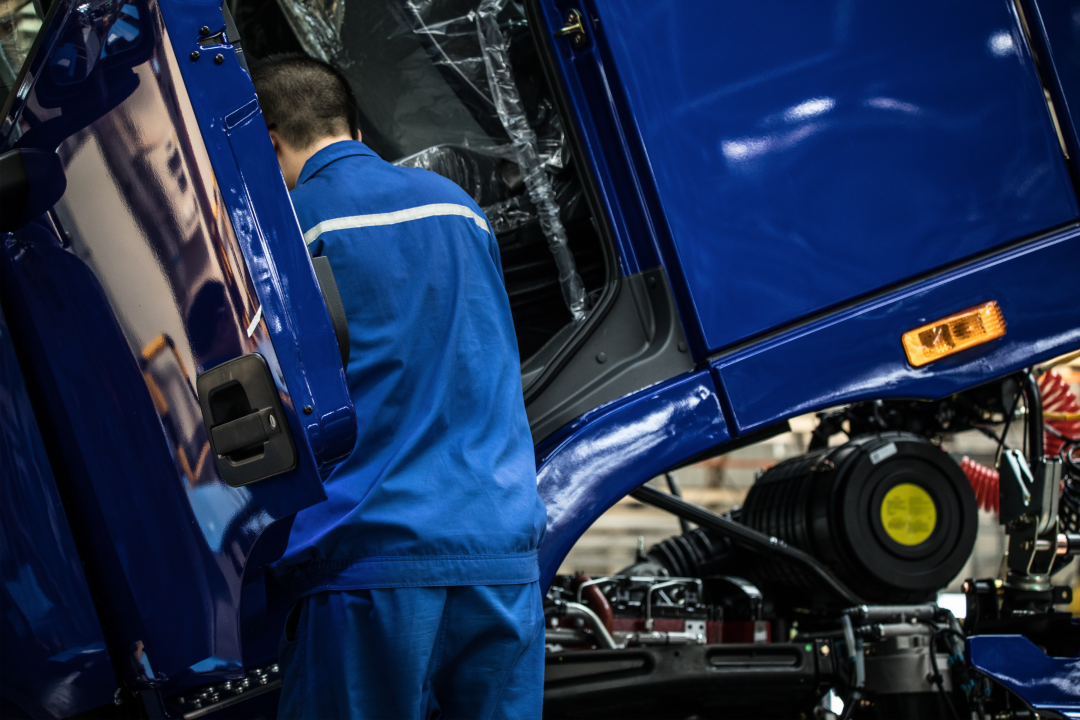
Susie Jones
Truckers met een handicap - welke ondersteuning is er beschikbaar?
Gemaakt: 12-08-2024
•
Bijgewerkt: 12-08-2024
In het Verenigd Koninkrijk geeft 23% van de beroepsbevolking aan dat ze gehandicapt zijn - velen weten niet dat een groot deel van hen vrachtwagenchauffeurs zijn die eindeloos door Europa trekken om uw goederen af te leveren. Ondanks hun vele uitdagingen onderstreept hun aanwezigheid in de vrachtwagenwereld het belang van inclusie en diversiteit in de sector.
Kan ik een vrachtwagen besturen als ik een handicap heb?
Als je een fysieke of cognitieve beperking hebt, mag je een vrachtwagen besturen. Je moet echter wel een medische keuring ondergaan om te bepalen of je fit genoeg bent. Een medische keuring bestaat uit het volgende:
Een gesprek met een arts over je gezondheid: Bestuurders moeten eerlijk en open zijn.
Een lichamelijk onderzoek waarbij je arts controleert:
Bloeddruk
Hart
Visie
Test op diabetes
Neurologische aandoeningen
Slaapstoornissen.
Na voltooiing beslist de DVLA of je mag rijden.
Truck aanpassingen
Voor chauffeurs met een lichamelijke beperking zijn de volgende aanpassingen beschikbaar:
Handbediening ter vervanging van pedalen
Stuurhulpmiddelen
Versnellers voor linkervoet
Ombouw koppeling
Harnassen
Gespecialiseerde zitplaatsen
Opbergsystemen voor rolstoelen.
In 2021 paste vrachtwagenfabrikant MAN vier [trucks voor bestuurders met een handicap] aan (https://trans.info/check-out-the-lorries-man-altered-to-accommodate-disabled-drivers-228342). De aanpassingen bestonden uit het uitrusten van de trucks met een hefplatform zodat rolstoelgebruikers gemakkelijk in de cabine kunnen komen - met alle bedieningselementen op of rond het stuur.
Hoewel de technologie en aanpassingen in de sector vooruitgaan, worden veel chauffeurs met een handicap nog steeds geconfronteerd met uitdagingen op het werk.

Met welke obstakels worden vrachtwagenchauffeurs met een handicap geconfronteerd?
Het kan moeilijk zijn voor gehandicapte chauffeurs om een baan in de sector te krijgen, zelfs als ze de vereiste kwalificaties hebben en hun medische keuring hebben gehaald. Veel bedrijven zijn terughoudend om een aangepast voertuig te leveren, omdat dit een dure investering kan zijn.
Voor chauffeurs die bereid zijn om te betalen voor de noodzakelijke aanpassingen, stelt Andy, CEO van de liefdadigheidsinstelling Globe Truckers UK, dat het nog steeds een uitdaging is om werk te vinden.
"Sommige transportbedrijven zijn huiverig om gehandicapten in dienst te nemen - ze zijn vaak huiverig voor de obstakels waarmee chauffeurs buiten de cabine te maken krijgen, bijvoorbeeld trappen en tillen."
David Chambers, een gehandicapte vrachtwagenchauffeur, heeft zich uitgesproken tegen de beproevingen waar hij dagelijks mee te maken heeft en heeft opgeroepen tot redelijke aanpassingen aan de Equality Act - vooral nadat de regering heeft opgeroepen om meer mensen met een arbeidsongeschiktheidsuitkering weer aan het werk te krijgen.
David en vele anderen hebben het moeilijk bij grote depots waar het depot volgens de [Equality Act] (https://www.legislation.gov.uk/ukpga/2010/15/contents) niet verplicht is redelijke aanpassingen te doen voor chauffeurs met een handicap. Om veiligheidsredenen moeten ze tijdens het uitladen bij hun trucks vandaan wachten, waardoor ze lange afstanden moeten lopen en trappen moeten beklimmen.
Welke ondersteuning is er voor vrachtwagenchauffeurs met een handicap?
Het vinden van steun kan lastig zijn voor mensen met levensveranderende verwondingen of ziekten. De Britse liefdadigheidsinstelling Globe Truckers is speciaal opgericht door chauffeurs om chauffeurs te helpen - door hulp te bieden aan gewonden, zieken en gehandicapten.
"Veel gehandicapte of gewonde bestuurders weten niet waar ze terecht kunnen omdat er heel weinig informatie voor hen beschikbaar is. Dat is waar wij om de hoek komen kijken en onze steun en begeleiding aanbieden - of het nu gaat om het doorverwijzen naar de juiste mensen of het bieden van financiering voor apparatuur."
"Sommige chauffeurs hebben gewoon iemand nodig om mee te praten en wij zijn er om hen op alle mogelijke manieren die steun te bieden. In de toekomst zouden we graag vrachtwagenaanpassingen voor chauffeurs financieren. Aanpassingen kunnen erg duur zijn en de meeste gehandicapte chauffeurs moeten deze uit eigen zak betalen. Om dit te bereiken hebben we meer financiering en steun van de industrie nodig," zegt Andy.
Hoe kan de industrie helpen?
Voor een meer inclusief en divers landschap moet de industrie meer doen om tegemoet te komen aan fysieke en cognitieve handicaps - een verandering die snel moet gebeuren, zegt Andy.
"Het is van vitaal belang dat de industrie haar steun en tijd weer in zichzelf steekt, of het nu rechtstreeks naar gehandicapte chauffeurs gaat of naar goede doelen zoals Globe Truckers. De industrie kan niet verwachten dat ze mensen aanspreekt als ze minderheden niet steunt."
Als toevluchtsoord voor veel chauffeurs kunnen truckstops het pad effenen door toegankelijke faciliteiten te bieden. In 2022 investeerde de regering £100 miljoen in de sector om faciliteiten langs de weg te verbeteren en veiligere truckparkings te creëren.

De overheidssubsidie zou de toegankelijkheid voor gehandicapte bestuurders bij populaire haltes kunnen verbeteren. Veranderingen zoals de volgende zouden een aanzienlijke impact kunnen hebben:
Rolstoeltoegankelijke parkeerplaatsen: bestuurders die moeilijk in en uit de cabine kunnen stappen, hebben extra ruimte nodig - vooral voor wie een tillift nodig heeft.
Toegankelijke voorzieningen: toegankelijke restaurants, toiletten en andere faciliteiten zorgen voor een inclusieve omgeving.
Vlootbedrijven kunnen helpen bij het creëren van een meer inclusieve omgeving door de volgende maatregelen te implementeren:
Aanpassen van trucks - zodat bestuurders met een handicap de trucks gemakkelijk kunnen bedienen met handbedieningen en adaptieve technologieën.
Ondersteuning en training - cursussen aanbieden om specifieke uitdagingen of behoeften aan te pakken.
Inclusieve wervingspraktijken - een onbevooroordeelde aanpak bij het werven bevordert een inclusieve en diverse cultuur.
Het bieden van een diverse en inclusieve cultuur is van vitaal belang om meer chauffeurs aan te trekken in de transportsector. Ondersteuning voor mensen met fysieke en cognitieve handicaps is door de sector over het hoofd gezien, waardoor veel chauffeurs niet weten tot wie ze zich moeten wenden. Gehandicapte chauffeurs bieden een uniek gezichtspunt en een aanpassingsvermogen dat een welkome verandering is voor de sector.
Wat moet u doen als u gehandicapt raakt tijdens uw carrière?
Als u een "meldingsplichtige" medische aandoening of handicap ontwikkelt, moet u de DVLA hiervan op de hoogte stellen - de DVLA zal het volgende doen:
Beslis per brief - sommige omstandigheden kunnen meer informatie vereisen.
Beoordeel je medische toestand en bepaal de uitkomst.
Als u uw voertuig moet aanpassen, hebt u een onafhankelijke beoordeling van uw aanpassingen nodig.
Als je moet stoppen met rijden, zal de DVLA je een medische reden geven waarom.



